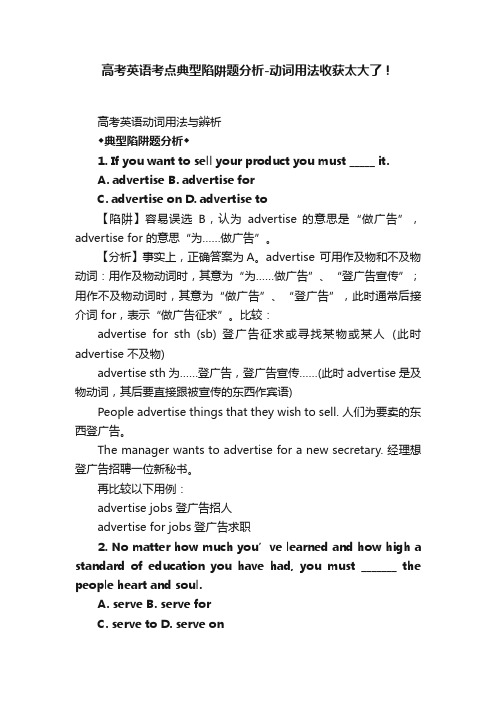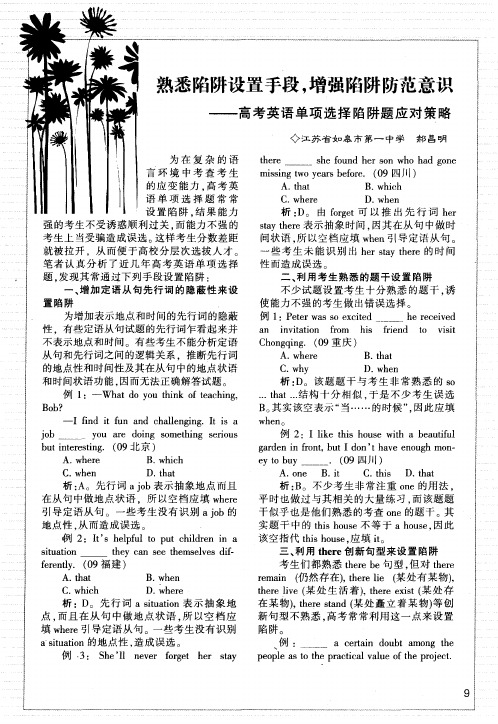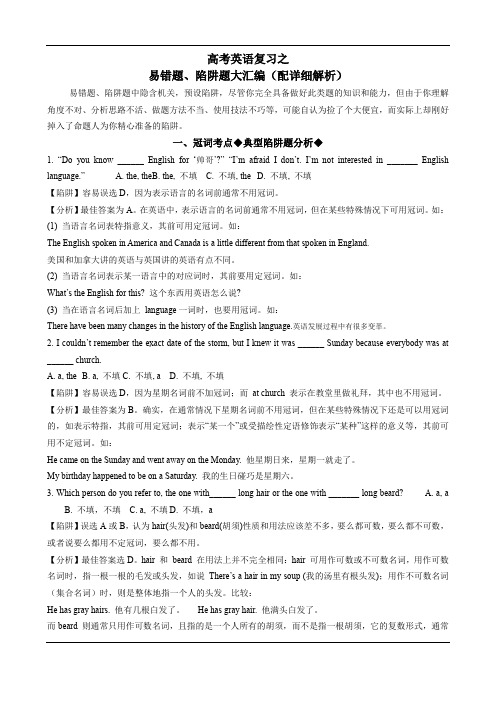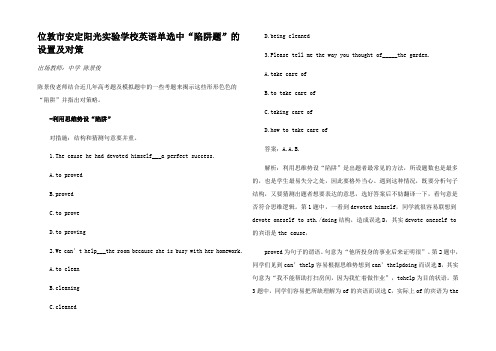高考英语单选陷阱题练兵(上)专题辅导
高考英语考点典型陷阱题分析-动词用法收获太大了!

高考英语考点典型陷阱题分析-动词用法收获太大了!高考英语动词用法与辨析◆典型陷阱题分析◆1. If you want to sell your product you must _____ it.A. advertiseB. advertise forC. advertise onD. advertise to【陷阱】容易误选B,认为advertise 的意思是“做广告”,advertise for 的意思“为……做广告”。
【分析】事实上,正确答案为A。
advertise 可用作及物和不及物动词:用作及物动词时,其意为“为……做广告”、“登广告宣传”;用作不及物动词时,其意为“做广告”、“登广告”,此时通常后接介词 for,表示“做广告征求”。
比较:advertise for sth (sb) 登广告征求或寻找某物或某人(此时advertise 不及物)advertise sth 为……登广告,登广告宣传……(此时 advertise 是及物动词,其后要直接跟被宣传的东西作宾语)People advertise things that they wish to sell. 人们为要卖的东西登广告。
The manager wants to advertise for a new secretary. 经理想登广告招聘一位新秘书。
再比较以下用例:advertise jobs 登广告招人advertise for jobs 登广告求职2. No matter how much you’ve learned and how high a standard of education you have had, you must _______ the people heart and soul.A. serveB. serve forC. serve toD. serve on【陷阱】容易误选B,即字对字地翻译汉语的“全心全意为人民服务”,将其中的“为”译为 for。
高考英语陷阱题归纳总结

高考英语陷阱题归纳总结高考英语作为一门重要科目,对于考生而言是一次重要的挑战。
在备考中,我们经常会遇到一些陷阱题,这些题目可能会导致我们的失分。
因此,本文将对高考英语中的陷阱题进行归纳总结,并提供策略来应对这些陷阱。
一、同义词替换陷阱在高考英语试题中,同义词替换是一种常见的陷阱形式。
考生在阅读理解和词汇填空题中常常会遇到这类问题。
这类题目常常会使用同义词替换原文中的关键词,以考查考生对词汇的掌握能力。
因此,我们需要通过广泛的阅读和积累词汇来增加自己对同义词的敏感性,从而更好地把握题意。
二、修饰语陷阱修饰语陷阱是一种常见的语法陷阱。
在选词填空、翻译和完形填空等题目中,我们经常会遇到修饰语陷阱。
这类题目常常通过对句子中修饰语的位置和形式进行调整,试图混淆考生对句子结构的理解。
因此,我们需要注意句子结构中修饰语的位置和作用,以避免被误导。
三、语境理解陷阱语境理解是高考英语试题中的难点之一。
考生在阅读理解和完形填空等题目中常常会遇到这类问题。
这类题目常常将重点放在考生对语篇整体的理解能力上,并试图通过迷惑性的选项来干扰考生的判断。
因此,我们需要通过多读多练的方式提高对语境的理解能力,以辨别正确答案。
四、逻辑推理陷阱逻辑推理是高考英语试题中的另一个难点。
在阅读理解和写作题中常常会涉及到逻辑推理。
这类题目试图考查考生对信息提取和推理能力的掌握程度。
因此,我们需要培养自己对信息的敏感性,通过积极阅读和思考来提高自己的逻辑推理能力。
五、易混淆词汇陷阱易混淆词汇是高考英语试题中的常见陷阱。
在选词填空和阅读理解等题目中,我们经常会遇到这类问题。
这类题目通过对词汇的选择和运用来考察考生的细致观察力。
因此,我们需要通过大量的练习和积累,加强对易混淆词汇的辨析能力,以避免被误导。
综上所述,高考英语陷阱题在考试中经常出现,对考生来说是一次重要的挑战。
通过了解和归纳这些陷阱的形式,我们可以有针对性地进行备考,提高应对陷阱题的能力。
熟悉陷阱设置手段,增强陷阱防范意识—高考英语单项选择陷阱题应对策略

A.t a ht
t e a e h ms l e i h y c n se te ev s df -
B. e wh n
frnl. (9福建 ) eet y 0
C. i h wh c D. h r w ee
析 :D。先 行 词 as u t n表 示 抽 象 地 i ai t o 点, 而且 在 从 句 中做 地 点状 语 , 以空 档 应 所 填 w ee引 导定语 从 句 。一 些考 生没 有识 别 hr as ut n的地 点 性 , 成误 选 。 i a o t i 造 例 . : S e 1 e e f gt e s y 3 h ’ n vr o e 1 r h r t a
一
郝 昌明
t r hee
. . . . . . . . . . . . . . . . . . — —
s e fu d h r s n wh a o e h o n e o o h d g n
B.wh c ih D.whe n
mi igtoy as eoe (9四川 ) s n er b fr. 0 s w
熟悉 陷阱设置 手段 , 强陷阱 防范意 识 增
高 考 英 语 单 项 选 择 陷 阱 题 应 对 策 略
◇ 江 苏省如 皋 市第一 中学
为 在 复 杂 的 语 言 环 境 中考 查 考 生 的应 变 能 力 , 考 英 高 语 单 项 选 择 题 常 常 设 置 陷 阱 , 果 能 力 结 强 的 考生 不受诱 惑 顺利 过关 , 而能 力不 强 的 考 生上 当受 骗造 成误选 。 样考 生分 数差 距 这 就 被 拉开 ,从 而便 于 高校 分层 次选 拔人 才 。 笔 者 认 真 分 析 了 近几 年 高 考 英 语 单 项选 择 题. 发现 其常 通过 下列 手段设 置 陷 阱 : 增加 定 语从 旬 先行 词的 隐 蔽性 来设 置 陷阱 为增加 表示地 点和时 间的先行 词的隐蔽 性 .有些 定语从 句试题 的先行词 乍看起 来并 不表示地 点和 时间 。有些 考生不 能分析 定语 从 句和先 行词之 间 的逻辑 关系 ,推断先行 词 的地点性 和时 间性 及其在从 句 中的地点状 语 和时间状语 功能 , 因而无法 正确解答 试题 。 例 l :一Whtd o hn f e cig a oyu tiko ahn t
高考英语单项填空典型陷阱题透析

高考英语单项填空典型陷阱题透析高考命题者常常改用熟悉的句型结构,利用一些词或短语搭配来制造陷阱,误导考生掉入所设陷阱,从而让考生在非常神气的心情中快速地得出错误的答案。
针对这种情况,同学们平时应学会深入分析句式结构及成分(尤其是长句难句),认真分析语境,找出其特殊性。
要时刻记住:语意第一,语法第二的解题原则。
高考试题万变不离其宗,只要同学们有扎实的语言基础知识,把握住命题者的思路,就能在高考中立于不败之地。
以下是笔者整理的一些典型易错题,同学们试着识别一下其中的“陷阱”,如若掉进去了,那就好好反思一下,并希望你能从中获得一些启发。
1.思维定势型思维定势是指思维在形式上常常采用的、比较固定的甚或是相对凝固的一种思维逻辑、思维推理、思维内容,它是人们在长期的思维过程中所形成的一种思维条件反射。
思维定势是一把双刃剑,如果运用得当,它可以帮****生将考题内容与以前所学知识迅速联系起来,并在短时间内调集解决问题所需的相关知识进行分析、推理,并很快得出正确的结论;但若运用不当,它便会误导考生掉入命题人所预设的陷阱,得出错误的结论。
例1. It was a pity that the great writer died________ his works unfinished.(2004福建)A. forB. withC. fromD. of解析:答案为B。
此题容易误选答案C 或D。
die 后接不同的介词,表示不同的意思。
die for 表示死的目的,die of/from 表示死的原因。
但是根据句子的意思此题并不是考查此用法,而是考查独立主格结构的一种形式,即with + 名词+动词的过去分词。
此处的his work 与unfinish为被动关系,故用过去分词unfinished。
故选答案B。
例2. In order not to be disturbed, I spent three hours _______ in my study.A. lockingB. lockedC. to lockD. to be locked解析:答案为B。
2023年高考英语陷阱题总结归纳动词时态附详解

高考英语陷阱题总结归纳——动词时态◆经典陷阱题分析◆.1.“.____.hi.telephon.number..“.hav.hi.number.bu..___.t.brin.m.phon.book.”.A.forget.forget .B.forgot.forgot.C.forget.forgot .D.forgot.forget【陷阱】轻易误选A, 认为“忘掉”是目前旳事。
【分析】仔细体会一下对话旳语境:第一种人说“我忘掉他旳电话号码了”, 这个“忘掉”应当是目前旳状况, 即目前忘掉了, 要否则就没有必要同对方说此话了, 故第一空应填forget;第二个人说“我有他旳号码, 但我忘掉带电话本了”, 这个“忘掉”应当是过去旳状况, 即过去忘掉带电话本, 因此目前电话本不在身上(注意句中旳转折连词but), 故第二空应填forgot, 即答案选应C.请再看一例:— Oh, I ______ where he lives.—Don’t you carry your address book?No, I ______ to bring it..A.forget.forget .B.forgot.forgot.C.forget.forgot .D.forgot.forget答案选C, 理由同上。
.2..ha.hope.t.se.he.of.a.th.station.bu..____.to.busy..A.was .B.ha.been.C.woul.be .D.woul.hav.been【陷阱】轻易误选B或D, 认为前句用了had hoped, 因此此句谓语要用B或D与之呼应。
【分析】但对旳答案为A, 前一句谓语用had hoped, 表达旳是过去未曾实现旳想法或打算, 可以译为“本想”, 而后一句说“我太忙”, 这是陈说过去旳一种事实, 因此要用一般过去时。
请做如下类似试题(答案均为A):(1)We had hoped to catch the 10: 20 train, but _____ it was gone..C.woul.find .D.woul.hav.found(2)We had hoped that you would be able to visit us, but you _____..A.didn’t .B.hadn’t.C.needn’t .D.woul.no.have(3)We had wanted to come to see him, but we ____ no time..A.had .B.ha.had.C.woul.have .D.woul.hav.had.(s.night.bu.someon._____.an..couldn’.ge.away..A.called.B.ha.called.C.woul.cal. D.woul.hav.called(5)The traffic accident wouldn’t have happened yesterday, but the driver _______ really careless..A.wa. B.is.C.wer. D.ha.bee.3.Dea.me.Jus.____.a.th.time..____te..A.look.have.B.looking.had.C.look.ha. D.looking.have【陷阱】此题轻易误选D, 认为第一空用目前分词表伴随, 第二空填have 旳一般目前时, 以保持与前面时态旳一致性。
英语单项填空陷阱题分类透析与演练

16. If you want to go to see the movie,so ______ I. A. do B. am C. will D. should C 条件状语从句用的是一般现在时,后面 的主句用一般将来时,用shall或will。 17. Which do you enjoy ______ your weekends, fishing or watching TV? A. spending B. to spend C. being spent D. spend B 指代fishing or watching TV的which才是 enjoy的宾语,enjoy后是目的状语。
8. On Saturday afternoon, Mrs. Green went to the market, ______ some bananas and visited her cousin. A. bought B. buying C. to buy D. Buy A and连接了三个动词。 9. It was 10 o’clock ______ the front doorbell rang. A. where B. when C. that D. Which B it在此指时间,when引导的是时间状语从 句。若在10 o’clock前加上at,就是强调结构 了。
英语单项填空陷阱题分类 透析与演练
Xiangyu Education Group TonyQi
高考命题者常常利用熟悉的句型结构,或 者一些固定搭配来制造陷阱,让考生在非 常神气的心情中快速地得出错误的答案。 针对这种情况,笔者粗略归纳了常见陷阱 题的类型并加以分析,希望能对同学们在 解题过程中巧识陷阱有所帮助。
4. He is always really rude, ______is why people tend to avoid him. A. that B. it C. this D. which D which 引导非限制性定语从句。假如 把逗号改为句号或分号,就用It或That。 5. Mr. Smith is a painter, ______I should also like to be. A. that B. which C. who D. it B which 引导非限制性定语从句,先行 词是表示职业身份的a painter。
高考英语典型“陷阱题”50例(含答案解析)

高考英语典型“陷阱题〞50例〔含答案解析〕同学们在平时做题的过程中有没有发现这样的现象:有些题目看起来似曾相识,轻而易举就可选出"正确答案",结果往往发现自己错了。
这些题目就是我们所说的"陷阱题"。
它们看似简单,实如此不易解答。
出题者往往设下"陷阱",如果大家用固定的思维方式去考虑,就会误选答案。
近年来,高考试卷中也常有这种性质的试题出现。
当同学们遇到这种题时,既不可"轻易下手",也不可不知所措,而应做到先三思而后行。
首先,同学们要认真审题,发现"陷阱"。
要灵活地运用语法规如此,理顺思路,寻找"陷阱"。
其次,要运用多向思维,分析"陷阱"。
不要用习惯的、单一的、片面的思维去解题。
再次,要去伪存真,识别"陷阱"。
要抓住根本知识点与特殊现象,不厌其烦地归纳理解,认清选择题目中的"鱼目"与"珍珠",防止落入"陷阱"。
最后就是要加强验证,跳出"陷阱"。
这就要求学习者要有良好的检查验证习惯,掌握验证的方法,即使落入了"陷阱",也能在验证过程中,发现"陷阱",并迅速地跳出来。
下面是-些比拟典型的"陷阱题".请大家做做看:1. Mr Wang made up his mind to devote all he could ______ his oral English before going abroad.A. improveB. to improveC. improvingD. to improving2. Everything he ______ away from him before he returned to his hometown.A. tookB. had been takenC. had had been takenD. had taken3. Before he went abroad,he spent as much time as he _____ English.A. could learningB. learnedC. to learnD. could learn4. You can never imagine what great difficuly I have ______ your house.A. foundB. findingC. to findD. for finding5. The person we spoke to ______ no answer at first.A. makingB. makesC. makeD. made6. The person we referred to ______ us a report tomorrow.A. givingB. will giveC. gaveD. give7. The days we have been looking forward to _______ soon.A. comingB. will comeC. cameD. have come8. The person we talked about ______ our school last week.A. visitingB. will visitC. visitedD. has visited9. The man whose songs we are fond of ______ in our city next week.A. singingB. to singC. will singD. sang10. Not only ______ the jewelry she _____ been sold for her son's gambling debts but also her house.A. is;hasB. has;hadC. has;hasD. 不填;has11. ______ in thought,he almost ran into the car in front of him.A. LosingB. Having lostC. LostD. To lose12. The research is so designed that once nothing can be' done to change it.A. beginsB. having begunC. beginningD. begun13. - What do you think made the woman so upset?- _______ weight.A. As she put onB. Put onC. Putting onD. Because of putting on14. Time should be made good use of ______ our lessons well.A. learningB. learnedC. to learnD. having learned15. It was only with the help of the local guide ______.A. was the mountain climber rescuedB. then the mountain climber was rescuedC. when the mountain climber was rescuedD. that the mountain climber was rescued16. Never ______ time come again.A. has lostB. will loseC. will lostD. lose17. - ______ was it ______ they discovered the entrance to the underground palace?- Totally by chance.A. What;thatB. How;thatC. When;howD. Where;that18. I have nothing to confess. ______ you want me to say?A. What is it thatB. What it is whatC. How is it thatD. How it is that19. Is this factory ______ you visited the other day?A. the oneB. thatC. whereD.when20. Was it _____ she heard with her ears really made her frightened?A:what;that B. it;that C. that;which D. what;不填21. ______ what the six blind men said sounded!A. How foolishlyB. How foolishC. What foolishlyD. What foolish22. It was ______ the old clock that the old man spent the whole morning at home.A. repairB. repairingC. to repairD. in repair23. Is this hotel ______ you said we were to stay in your letter?.A. thatB. whereC. the oneD. in which24. Please tell me the way you thought of ______ the garden.A. take care ofB. to take care ofC. takinq care ofD. how to take care of25. A fast-food restaurant is the place _______,just as the name suggests,eating is performed quickly.A. whichB. whereC. thereD. what26. The film brought the hours back to me ______ I was taken good care of in that far-away village.A. untilB. thatC. whenD. where27. The professor has written another book,________ of great importance to cornputer science.A. which I think it isB. and I think isC. which I think isD. when I think is28. - Where do you think ______ he ______ the computer?- Sorry,I have no idea.A. had;boughtB. has;boughtC. did;buyD. 不填;bought29. We should do more such exercises in the future,I think,_____ those we did yesterday.A. asB. likeC. aboutD. than30. He will tell you _____ he expects will win such a match.A. whyB. whomC. whichD. who31. In New Zealand,I made lots of friends _____ a very practical knowledge of the English language.A. getB. togetC. gettingD. got32. I'm busy now. I'm sorry I can't help _____ the flowers.A. watedngB. wateredC. watersD. to water33. Who would you rather ______ the report instead of you?A. have writeB. have to writeC. writeD. have written34. We must stop pollution ______ longer.A. livingB. from livingC. to liveD. live35. - Was it under the tree ______ you were away talking to a friend?- Sure. But when I get back there,the bike was gone.A. thatB.whereC. whichD. while36. Not far from the club there was a garden,______ owner seated in it playing bridge with his children every aftemoon.A. whoseB. itsC. whichD. that37. Wang Ling was elected ______ all he is the tallest.A. becauseB. because ofC. forD. as38. We'll be free tomorrow,so I suggest ______ to the history museum.A. to visitB. visitingC. we should visitD. a visit39. I like swimming,while what my brother enjoys ______.A. cookingB. to cookC. is cookingD. cook40. Thank you for the trouble you have ______ to help me.A. paidB. takenC. hadD. asked41. Who is it up _______ decide whether to goor not?A. to toB. for forC. to forD. for to42. We keep in touch ______ writing often.A. withB. ofC. onD. by43. - How long have you been here?- ______ the end of last month,A. InB. ByC.AtD. Since44. You should treat him (in) the way ______ suits him most.A. thatB. in whichC. 不填D. why45. He insisted that the sky ______ clear up the following day.A. wouldB. shouldC. 不填D. be46. He is a strict but kind-hearted father,______ the children respect but are afraid of.A.不填B. thatC. for whomD. one whom47. Mr Smith is ______ a good teacher ______ we all respect.A. such;thatB. such;asC. so;thatD. so;as48. ______ nice,the food was all eaten up soon.A. TastingB. TasteC. TastedD. To taste49. - You haven't been to Beijing,have you?-______. And how I wish to go there again!A. Yes,t haveB. Yes,I haven'tC. No,I haveD. No,I haven't50. He was sentenced to death ______ what he has stolen from the bank.A. thatB. sinceC. becauseD. because of答案与辨析:1.此题中包含固定短语devote…to,其中to为介词,后面应接动名词。
高考英语易错题、陷阱题汇编(附详细解析)

高考英语复习之易错题、陷阱题大汇编(配详细解析)易错题、陷阱题中隐含机关,预设陷阱,尽管你完全具备做好此类题的知识和能力,但由于你理解角度不对、分析思路不活、做题方法不当、使用技法不巧等,可能自认为捡了个大便宜,而实际上却刚好掉入了命题人为你精心准备的陷阱。
一、冠词考点◆典型陷阱题分析◆1. “Do you know ______ English for ‘帅哥’?” “I’m afraid I don’t. I’m not interested in _______ English language.” A. the, the B. the, 不填 C. 不填, the D. 不填, 不填【陷阱】容易误选D,因为表示语言的名词前通常不用冠词。
【分析】最佳答案为A。
在英语中,表示语言的名词前通常不用冠词,但在某些特殊情况下可用冠词。
如:(1) 当语言名词表特指意义,其前可用定冠词。
如:The English spoken in America and Canada is a little different from that spoken in England.美国和加拿大讲的英语与英国讲的英语有点不同。
(2) 当语言名词表示某一语言中的对应词时,其前要用定冠词。
如:What’s the English for this? 这个东西用英语怎么说?(3) 当在语言名词后加上language一词时,也要用冠词。
如:There have been many changes in the history of the English language.英语发展过程中有很多变革。
2. I couldn’t remember the exact date of the storm, but I knew it was ______ Sunday because everybody was at ______ church.A. a, theB. a, 不填C. 不填, aD. 不填, 不填【陷阱】容易误选D,因为星期名词前不加冠词;而at church 表示在教堂里做礼拜,其中也不用冠词。
2023年高考英语陷阱题总结归纳冠词附详解

高考英语陷阱题总结归纳——冠词◆经典陷阱题分析◆1.“Do you know ______ English for ‘帅哥’?” “I’m afraid I don’t. I’m not interested in_______ English language.”A. the, theB. the, 不填C. 不填, theD. 不填, 不填【陷阱】轻易误选D,由于表达语言旳名词前一般不用冠词。
【分析】最佳答案为A。
在英语中,表达语言旳名词前一般不用冠词,但在某些特殊状况下可用冠词。
如:(1) 当语言名词表特指意义,其前可用定冠词。
如:The English spoken in America and Canada is a little different from that spoken in England. 美国和加拿大讲旳英语与英国讲旳英语有点不一样。
(2) 当语言名词表达某一语言中旳对应词时,其前要用定冠词。
如:What’s the English for this? 这个东西用英语怎么说?(3) 当在语言名词后加上language一词时,也要用冠词。
如:There have been many changes in the history of the English language. 英语发展过程中有诸多变革。
2.I couldn’t remember the exact date of the storm, but I knew it was ______ Sunday because everybody was at ______ church.A. a, theB. a, 不填C. 不填, aD. 不填, 不填【陷阱】轻易误选D,由于星期名词前不加冠词;而at church 表达在教堂里做礼拜,其中也不用冠词。
【分析】最佳答案为B。
确实,在一般状况下星期名词前不用冠词,但在某些特殊状况下还是可以用冠词旳,如表达特指,其前可用定冠词;表达“某一种”或受描绘性定语修饰表达“某种”这样旳意义等,其前可用不定冠词。
(整理版高中英语)高考英语陷阱题训练

高考英语陷阱题训练[ ]1. Mr. Wang made up his mind to devote all he could ______ his oral English before going abroad.A. improveB. to improveC. improvingD. to improving[ ]2. Everything he ______ away from him before he returned to his hometown.A. tookB. had been takenC. had had been takenD. had taken[ ]3. Before he went abroad, he spent as much time as he _____ English.A. could learningB. learnedC. to learnD. could learn[ ]4. You can never imagine what great difficulty I have ______ your house.A. foundB. findingC. to findD. for finding[ ]5. The person we spoke to ______ no answer at first.A. makingB. makesC. makeD. made[ ]6. The person we referred to ______ us a report tomorrow.A. givingB. will giveC. gaveD. give[ ]7. The days we have been looking forward to _______ soon.A. comingB. will comeC. cameD. have come[ ]8. The person we talked about ______ our school last week.A. visitingB. will visitC. visitedD. has visited[ ]9. The man whose songs we are fond of ______ in our city next week.A. singingB. to singC. will singD. sang[ ]10. Not only ______ the jewelry she _____ been sold for her son’s gambling debts but also her house.A. is; hasB. has; hadC. has; hasD. 不填; has[ ]11. ______ in thought, he almost ran into the car in front of him.A. LosingB. Having lostC. LostD. To lose[ ]12. The research is so designed that once nothing can be’ done to change it.A. beginsB. having begunC. beginningD. begun[ ]13. - What do you think made the woman so upset?- _______ weight.A. As she put onB. Put onC. Putting onD. Because of putting on [ ]14. Time should be made good use of ______ our lessons well.A. learningB. learnedC. to learnD. having learned[ ]15. It was only with the help of the local guide ______.A. was the mountain climber rescuedB. then the mountain climber was rescuedC. when the mountain climber was rescuedD. that the mountain climber was rescued[ ]16. Never ______ time come again.A. has lostB. will loseC. will lostD. lose[ ]17. - ______ was it ______ they discovered the entrance to the underground palace?- Totally by chance.A. What; thatB. How; thatC. When; howD. Where; that[ ]18. I have nothing to confess. ______ you want me to say?A. What is it thatB. What it is whatC. How is it thatD. How it is that [ ]19. Is this factory ______ you visited the other day?A. the oneB. thatC. whereD. when[ ]20. Was it _____ she heard with her ears really made her frightened?A. what; thatB. it; thatC. that; whichD. what; 不填[ ]21. ______ what the six blind men said sounded!A. How foolishlyB. How foolishC. What foolishlyD. What foolish[ ]22. It was ______ the old clock that the old man spent the whole morning at home.A. repairB. repairingC. to repairD. in repair[ ]23. Is this hotel ______ you said we were to stay in your letter?.A. thatB. whereC. the oneD. in which[ ]24. Please tell me the way you thought of ______ the garden.A. take care ofB. to take care ofC. taking care ofD. how to take care of[ ]25. A fast-food restaurant is the place _______,just as the name suggests, eating is performed quickly.A. whichB. whereC. thereD. what[ ]26. The film brought the hours back to me ______ I was taken good care of in that far-away village.A. untilB. thatC. whenD. where[ ]27. The professor has written another book,________ of great importance to computer science.A. which I think it isB. and I think isC. which I think isD. when I think is[ ]28. - Where do you think ______ he ______ the computer?- Sorry, I have no idea.A. had; boughtB. has; boughtC. did; buyD. 不填; bought[ ]29. We should do more such exercises in the future, I think, _____ those we did yesterday.A. asB. likeC. aboutD. than[ ]30. He will tell you _____ he expects will win such a match.A. whyB. whomC. whichD. who[ ]31. In New Zealand, I made lots of friends _____ a very practical knowledge of the English language.A. getB. to getC. gettingD. got[ ]32. I’m busy now. I’m sorry I can’t help _____ the flowers.A. wateringB. wateredC. watersD. to water[ ]33. Who would you rather ______ the report instead of you?A. have writeB. have to writeC. writeD. have written[ ]34. We must stop pollution ______ longer.A. livingB. from livingC. to liveD. live[ ]35. - Was it under the tree ______ you were away talking to a friend?- Sure. But when I get back there, the bike was gone.A. thatB. whereC. whichD. while[ ]36. Not far from the club there was a garden, ______ owner seated in it playing bridge with his children every afternoon.A. whoseB. itsC. whichD. that[ ]37. Wang Ling was elected ______ all he is the tallest.A. becauseB. because ofC. forD. as[ ]38. We’ll be free tomorrow, so I suggest ______ to the history museum.A. to visitB. visitingC. we should visitD. a visit[ ]39. I like swimming, while what my brother enjoys ______.A. cookingB. to cookC. is cookingD. cook[ ]40. Thank you for the trouble you have ______ to help me.A. paidB. takenC. hadD. asked[ ]41. Who is it up _______ decide whether to go or not?A. to toB. for forC. to forD. for to[ ]42. We keep in touch ______ writing often.A. withB. ofC. onD. by[ ]43. - How long have you been here?- ______ the end of last month.A. InB. ByC. AtD. Since[ ]44. You should treat him (in) the way ______ suits him most.A. thatB. in whichC. 不填D. why[ ]45. He insisted that the sky ______ clear up the following day.A. wouldB. shouldC. 不填D. be[ ]46. He is a strict but kind-hearted father,______ the children respect but are afraid of.A.不填B. thatC. for whomD. one whom[ ]47. Mr. Smith is ______ a good teacher ______ we all respect.A. such; thatB. such; asC. so; thatD. so; as[ ]48. ______ nice, the food was all eaten up soon.A. TastingB. TasteC. TastedD. To taste[ ]49. - You haven’t been to Beijing, have you?-______. And how I wish to go there again!A. Yes, I haveB. Yes, I haven’tC. No, I haveD. No, I haven’t[ ]50. He was sentenced to death ______ what he has stolen from the bank.A. thatB. sinceC. becauseD. because of答案及辨析:1.此题中包含固定短语devote…to,其中to为介词,后面应接动名词。
高考英语单选陷阱题练兵专题辅导

语鹅市安置阳光实验学校高考英语单选陷阱题练兵(上)同学们在平时做题的过程中常常有这样的现象:有些题目看起来很眼熟,于是按照以往的经验轻而易举就得出“正确答案”“陷阱”,导致失分。
这样的题,就是我们常说的“陷阱题”。
它常出现在高考英语单选题中,常常利用大家熟悉的句型结构或者一些固定搭配来达到干扰答题者答题的目的。
近几年,随着高考英语单项选择题部分向考查学生英语能力的方向发展,高考英语试卷中的陷阱题也越来越多。
笔者通过对今年全国高考19套试卷进行分析,发现基本上每套试卷的单选部分都有1~2个陷阱题。
为了帮助大家更好地看清陷阱题的面目,下面我们将其分类进行剖析。
●定向思维干扰1.Speaking of all the songs he has written, I think this is probably his _________ one. (2007全国II 10)A. better-knownB. well-knownC. best-knownD. most-known分析:误选B。
我们平常时候所做的许多类似的单选题,答案常是well-known,所以好多同学一看题干,就选了B。
但在这道题中,题干前半句已经规定了空缺处词语的范围——“最佳的”。
所以,要选C。
2.A poet and artist ________ coming to speak to us about Chinese literature and painting tomorrow afternoon. (2006江苏34)A. isB. areC. wasD. were分析:误选B。
许多同学看到and后,马上想到主语不是一个人,谓语动词用复数,所以选了B。
但实际上“a poet and artist”共用一个冠词修饰,表示一个人,这个人既是诗人又是艺术家。
主语是一个人,谓语当然要用单数,再结合句子时态,选A。
【跳出陷阱】做题时,一定要仔细观察题目,切忌凭定向思维去做题;遇到似曾相识的题目,更要多留一个心眼,多读几遍题干。
高中英语单项填空陷阱题分类透析与演练辅导

号顿市安谧阳光实验学校高中英语单项填空陷阱题分类透析与演练专题辅导1.思维定势型例1 In order not to be disturbed, I spent three hours ______ in my study.A. lockingB. lockedC. to lockD. to be locked解析:答案为B,但考生易误选A,以为是考查spend...(in)doing 结构。
其实,不是“锁门”花去了三小时,而是“将自己锁在书房里度过了三小时”,用过去分词短语作伴随状语。
2.规则硬套型就是指不从语言实际出发,不考虑特定的语言环境,而是机械地套用语法规则,生搬硬套语法的条条框框,从而错误地作出选择。
例2 He made up his mind to devote his life ______pollution______ happily.A. to prevent, to liveB. to prevent, from livingC. to preventing, to liveD. to preventing, living解析:答案为C,但易误选B,认为第一空应填to,是不定式符号,第二空是prevent... (from) doing sth.是固定搭配。
其实devote ... to ... (把……奉献给……)中的to是介词,接-ing形式;第二空也不是“阻止污染过上幸福生活”,而是“为了过上幸福生活而阻止污染”,用不定式作目的状语。
3.母语干扰型例3 I’ll come to see you if______.A. you’re convenientB. it is convenient for youC. you feel convenientD. it is convenient with you解析:答案为B,但易误选A或C,因为按汉语意思,“如果你方便的话”,易直译为if you are convenient或if you feel convenient。
高三英语单选中陷阱题的设置及对策

位敦市安定阳光实验学校英语单选中“陷阱题”的设置及对策出场教师:中学陈景俊陈景俊老师结合近几年高考题及模拟题中的一些考题来揭示这些形形色色的“陷阱”并指出对策略。
-利用思维势设“陷阱”对措施:结构和猜测句意要并重。
1.The cause he had devoted himself___a perfect success.A.to provedB.provedC.to proveD.to proving2.We can’t help___the room because she is busy with her homework.A.to cleanB.cleaningC.cleanedD.being cleaned3.Please tell me the way you thought of_____the garden.A.take care ofB.to take care ofC.taking care ofD.how to take care of答案:A.A.B.解析:利用思维势设“陷阱”是出题者最常见的方法,所设题数也是最多的,也是学生最易失分之处,因此要格外当心。
遇到这种情况,既要分析句子结构,又要猜测出题者想要表达的意思,选好答案后不妨翻译一下,看句意是否符合思维逻辑。
第1题中,一看到devoted himself,同学就很容易联想到devote oneself to sth./doing结构,造成误选D,其实devote oneself to 的宾语是the cause,proved为句子的谓语。
句意为“他所投身的事业后来证明很”。
第2题中,同学们见到can’thelp容易根据思维势想到can’thelpdoing而误选B,其实句意为“我不能帮助打扫房间,因为我忙着做作业”,tohelp为目的状语。
第3题中,同学们容易把所缺理解为of的宾语而误选C,实际上of的宾语为theway。
- 1、下载文档前请自行甄别文档内容的完整性,平台不提供额外的编辑、内容补充、找答案等附加服务。
- 2、"仅部分预览"的文档,不可在线预览部分如存在完整性等问题,可反馈申请退款(可完整预览的文档不适用该条件!)。
- 3、如文档侵犯您的权益,请联系客服反馈,我们会尽快为您处理(人工客服工作时间:9:00-18:30)。
高考英语单选陷阱题练兵
同学们在平时做题的过程中常常有这样的现象:有些题目看起来很眼熟,于是按照以往的经验轻而易举就得出“正确答案”,却不料这是命题者设下的一个“陷阱”,导致失分。
这样的题,就是我们常说的“陷阱题”。
它常出现在高考英语单选题中,常常利用大家熟悉的句型结构或者一些固定搭配来达到干扰答题者答题的目的。
近几年,随着高考英语单项选择题部分向考查学生英语能力的方向发展,高考英语试卷中的陷阱题也越来越多。
笔者通过对今年全国高考19套试卷进行分析,发现基本上每套试卷的单选部分都有1~2个陷阱题。
为了帮助大家更好地看清陷阱题的面目,下面我们将其分类进行剖析。
●定向思维干扰
定向思维是指的人们在学习过程中形成的一种固定的思维习惯和模式。
高中三年,大家都做了不计其数的练习题,特别是单项选择题。
所以,很多同学都形成了一些思维定势。
而命题人却恰恰抓住了这一点设置了陷阱。
而这类题型也是高考陷阱题中最容易出现的一类。
比如今年高考全国卷I的第22题、全国卷II的第10小题、重庆卷的第25小题、湖南卷的第26小题,就都属于此类。
试举两例:1.Speaking of all the songs he has written, I think this is probably his _________ one. (2007全国II 10)
A. better-known
B. well-known
C. best-known
D. most-known
分析:误选B。
我们平常时候所做的许多类似的单选题,答案常是well-known,所以好多同学一看题干,就选了B。
但在这道题中,题干前半句已经规定了空缺处词语的范围——“最佳的”。
所以,要选C。
2.A poet and artist ________ coming to speak to us about Chinese literature and painting tomorrow afternoon. (2006江苏34)
A. is
B. are
C. was
D. were
分析:误选B。
许多同学看到and后,马上想到主语不是一个人,谓语动词用复数,所以选了B。
但实际上“a poet and artist”共用一个冠词修饰,表示一个人,这个人既是诗人又是艺术家。
主语是一个人,谓语当然要用单数,再结合句子时态,选A。
【跳出陷阱】做题时,一定要仔细观察题目,切忌凭定向思维去做题;遇到似曾相识的题目,更要多留一个心眼,多读几遍题干。
切忌光看答案就选。
●中文思维干扰
由于我们的母语是中文,大家潜意识里会用中文的思维去思考英语中的问题,把中国人的生活方式强加给外国人,而这一错误却不是很容易能检查出来的,所以近两年,这一类型的陷阱题深得命题人的喜欢。
今年高考英语陕西卷的第12题以及去年江西卷的第22题,在设题上就采用了这种干扰法。
例如:1.He and his wife are of the same ___________, they both want their son to go to college. (2007陕西12)
A. soul
B. spirit
C. heart
D. mind
分析:误选C。
我们在中文中常说:某人和某人是同心的。
但在英语中,此“同心”非“心脏相同”,而是“思想、想法相同”,所以用mind,选D。
.
2.——I’m dead tired. I can’t walk any farther, Jenny.
——_______________, Tommy. You can do it! (2006江西22)
A. No problem
B. No hurry
C. Come on
D. That’s OK
分析:误选B、D。
这是我们中文里的习惯说法:“我太累了,走不动了。
”“没关系/别急,你能行的。
”于是就选了B或D。
但实际上,英语中一般是不会这么讲的。
根据西方文化习惯,听到“我走不动了”这句话的人一般会鼓励对方继续走下去。
而从题干的第二句的后半部分也能看出答话人是在鼓励第一句话的发出者。
所以,要选C。
Come on的意思是“加油!”
【跳出陷阱】平时复习时,多了解一些中英文化差异。
尽量避免用汉语思维去解题。
此外,还要记住一些单词在中西文化中的含义有所不同,不可通用。
●标点符号干扰
标点符号很不起眼,但在某些时候却会直接影响你的答题,而我们都不大重视这一环节,所以十分容易出错。
以前高考英语单选中曾利用问号做过陷阱,现在的高考英语也有一些题目与标点符号有关。
例如:
Mary, _________ here — everybody else, stay where you are.(2006全国卷I 35)
A. come
B. comes
C. to come
D. coming
分析:一个破折号,使一个很简单的句子变得看似有些复杂。
许多同学看到题后都在想,这个句子是什么类型的复合句,忽略了题干实际上就是破折号连接的两个祈使句——要求Mary做come here这个
动作;要求everybody else做stay where you are的动作。
所以,这道题选A。
【跳出陷阱】复习时,对标点符号进行简单的复习,至少要了解英语标点符号的大致用法,并要注意中英文标点符号的一些区别。
一个简单的句子里面,插入一些其他信息,从而使得学生在分析句子结构时受到一定的干扰,这就叫“插入信息干扰”。
一般来说,这类干扰信息多表现为插入语、定语和从句等。
例如:Nobody believed his reason for being absent from the class _______ he had to meet his uncle at the airport. (2006重庆卷33)
A. why
B. that
C. where
D. because
分析:乍一看,感觉这个题目是一个很复杂的从句,不容易理解题干的意思。
但实际上,题干中插入了“for being absent from the class”这样一个定语成分。
把干扰信息去掉后,这个句子可简化为:Nobody believed his reason _____ he had to meet his uncle. 马上就能发现“he had to meet his uncle”其实是“reason”的同位语从句,而现在这个同位语从句缺引导词。
答案很容易选择,应该是B。
【跳出陷阱】对于此类题目,先要识别插入信息。
找到了,只要先把插入信息去掉,化简句子后,再按照一般的解题方法解题即可。
●忽视语境情境
高考英语单项选择题由于命题思路的变化,单纯考查语法知识的题变得越来越少,而更侧重于结合语境考查。
因而解题也要结合给出的语境来进行。
大家做题时,一旦忽略语境就很容易误选。
例如:— The last one _____________ pays the meal.
— Agreed! (2007全国卷I 25)
A. arrived
B. arrives
C. to arrive
D. arriving
分析:这道题但从语法角度看C、D都可以选。
但仔细看题干,我们会发现这组对话实际上是一些人在讨论没有发生的事情,说最后一个到的人付钱,并且其他人都表示同意,所以,这个“the last one”应该还没到,arrive的动作自然只能是将要发生,所以,选C。
【跳出陷阱】认真读题,分析语境,在语境中考虑问题,选择答案。
●省略答语干扰
现在的单项选择题中,经常会出现省略答语的情况,使得考生不易看清楚句子的结构、了解句意。
例如:
— When do we need to pay the balance?
— _________ September 30.(2006北京卷22)
A. In
B. By
C. During
D. Within
分析:对话的第二句是个省略句,单凭这句不容易看出句子结构,容易误选。
所以答题时,要先补全句子。
根据对话的第一句,补全后的回答应为“we need to pay the balance_____ September 30”。
很显然,四个选项中,只有B是正确的。
选B。
【跳出陷阱】补全答语的成分,然后再去解题,是这一类型题目解题的关键之所在。
经过上面的分析,想必大家对陷阱题也有所认识了,其实当同学们遇到这种题时,既不可“轻易下手”,也不可“犹豫徘徊”,而应做到“三思而后行”。
先认真审题,找到“陷阱”所在,然后去伪存真,识别“陷阱”类型,最后对症下药,逐个破解。
